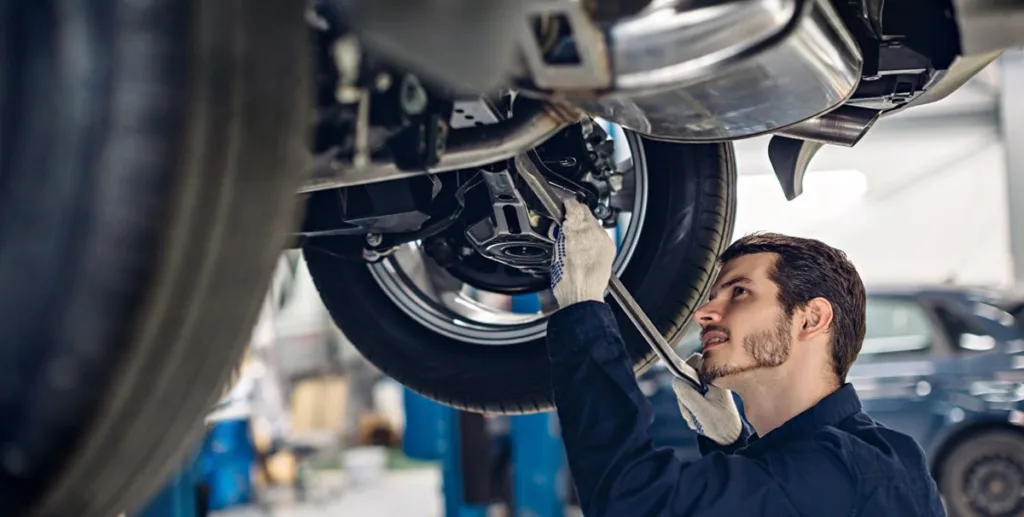All Categories
Featured

[/image]
Your automobile's brakes are just one of one of the most critical components in guaranteeing your safety and the safety and security of others when driving. Regular brake evaluations are crucial to keeping optimal stopping performance and staying clear of costly repair services. Whether you're an experienced cars and truck owner or a brand-new vehicle driver, recognizing brake evaluation standards can help you remain aggressive concerning maintenance and ensure your car is always roadworthy.
- Why Brake Inspections Matter. The more you drive, the much more friction your brake pads endure, ultimately leading to decreased braking effectiveness. Without proper assessment, it's challenging to determine when your brakes could be in need of repair service.
A well-kept brake system makes sure quick, responsive quiting power, particularly in emergencies. It also helps prolong the life of your automobile, as overlooking brake upkeep can bring about a lot more serious, expensive issues later on.
- Signs You Need a Brake Evaluation. While it's important to have your brakes inspected occasionally, certain indicators may suggest that they require focus. Keep an eye (and ear) out for these caution signals:
Squeaking or Grinding Sounds: Uncommon sounds, especially a shrill squeal or grinding noise, often imply that your brake pads are used down. Vibration or Pulsation: If you feel vibrations or a pulsing feeling when pressing the brake pedal, it could be an indication of distorted rotors or irregular brake pad wear. Lowered Brake Responsiveness: If your brakes feel much less responsive or you need to press the pedal harder to reduce, it may show air in the brake lines or low brake liquid. Pulling away: If your lorry draws to one side when stopping, it can suggest unequal brake pad wear or a brake liquid leak. Control Panel Caution Lights: Some automobiles have brake-related warning lights that show concerns like reduced brake fluid or worn brake elements. If you observe any one of these signs and symptoms, it's crucial to have an expert mechanic do a brake evaluation immediately.

- What Occurs During a Brake Evaluation? During a brake examination, a mechanic will certainly inspect several key parts of the stopping system to make certain whatever is in functioning order. Below's what you can expect throughout the process:
Brake Pads and Shoes: The technician will certainly inspect the density of the brake pads or shoes. If they're also slim, they'll require to be replaced. Brake Rotors: Rotors are the discs that the brake pads press against to reduce your car down. They'll be looked for any type of indications of wear, scoring, or warping. Brake Liquid: Reduced or polluted brake fluid can harm stopping performance. The technician will certainly inspect the fluid degree and high quality and top it up or purge it if required. Brake Lines and Tubes: Brake lines lug fluid from the master cylinder to the brakes. The mechanic will certainly check for any kind of leaks, cracks, or damages to guarantee correct fluid flow. Brake Calipers and Wheel Cylinders: Calipers and wheel cylinders push the brake pads versus the rotors or drums. The technician will certainly look for wear, leaks, and correct procedure. 4. How Typically Should You Have Your Brakes Inspected? The frequency of brake examinations depends on aspects like your driving routines, the type of automobile you drive, and the atmosphere in which you drive. As a general rule, it's a great idea to have your brakes inspected every 12,000 miles or yearly. If you experience any of the caution signs discussed earlier, it's important to obtain your brakes checked promptly.
For those who frequently drive in rush hour, mountainous terrain, or rough weather, more constant inspections may be necessary.
- Value of Timely Brake Repairs. When you find an issue with your brakes, it's important to address it right now. Postponing brake repair services can cause more significant damage to your stopping system, leading to greater repair prices. In extreme situations, ignoring brake problems can cause complete brake failure, which is a significant safety danger.
By remaining on top of brake upkeep and addressing concerns promptly, you make sure that your brakes remain to do as planned, keeping you and your passengers risk-free when driving.
Final Thought: Maintain Your Brakes in Top Forming. Brake examinations are a simple yet vital part of vehicle maintenance. By comprehending the importance of routine evaluations, recognizing the indicators of brake problems, and staying aggressive with fixings, you can guarantee your lorry's stopping system stays in optimal condition.
Latest Posts
Explore WyHy Federal Credit Union – Top Benefits for Your Financial Success
Explore Your Financial Partner at WyHy – Key Advantages for Your Financial Success
The Power of Strategic Media Preparation with Complete Circle Advertising
More
Latest Posts
Explore WyHy Federal Credit Union – Top Benefits for Your Financial Success
Explore Your Financial Partner at WyHy – Key Advantages for Your Financial Success
The Power of Strategic Media Preparation with Complete Circle Advertising